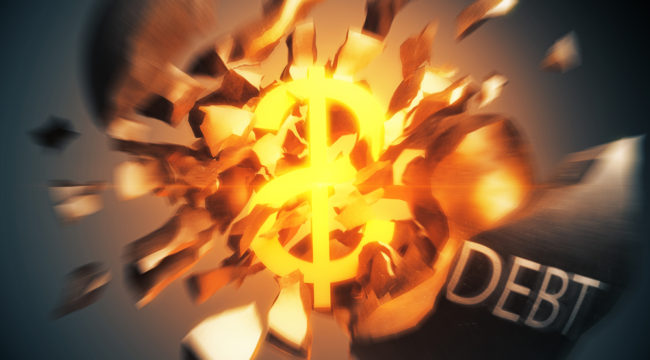What Replaces the System After It Self-Destructs?
What will replace the current system after it self-destructs? That’s the question.
You know those disclosures on your credit card statements? That it will take 27 years to pay off your balance if you only make the minimum payment each month, and so on?
You might not be aware of it, but America’s “credit card” — our national debt — comes with its own disclosure statement:

The only possible output of a system like this, lacking any discipline, is self-destruction.
Whatever is free is squandered. When water is free, it’s freely wasted. When electricity is free, there’s no motivation to use it wisely.
The same principle holds true for money. If money is free, or nearly free, there is no motivation to invest it wisely, or to consider the opportunity costs of spending it versus investing it or preserving it as savings.
Money that can be borrowed for next to nothing is essentially “free” because the costs of interest are negligible. Money that can be borrowed in virtually unlimited quantities is also “free,” as whatever funds are squandered or lost to malinvestment can be easily replaced with more borrowed money.
Nothing enduringly productive can be built without discipline and a steady focus on the bottom line of production costs, revenues, overhead expenses and opportunity costs, i.e., what else could have been done with this capital and labor.
All of which leads us to ask: What precisely have we accomplished by borrowing and blowing $9 trillion in additional national debt over the past eight years?
With interest rates near zero and the credit line of the nation essentially unlimited — recall that the central bank created $3.5 trillion of money out of thin air and used much of it to buy federal bonds — there was no need for any difficult choices or trade-offs — that is, discipline.
Lowering interest rates to near zero has reduced the need for fiscal-political discipline to near zero.
Politicos of all stripes are only too willing to borrow trillions from future generations — why not borrow and blow the money now to assure my re-election and let future taxpayers figure out what to do about the crushing burden of debt we’re leaving them?
High interest rates were basically the only mechanism of discipline imposed on short-term, free-spending politicos. Once the cost of interest was reduced to signal noise, politicos were freed of the burdens of discipline: of having to reckon the burdens of future interest, of opportunity costs, of trade-offs and the difference between productive investments and cronyist pork-barrel spending on marginal (but highly profitable) “infrastructure.”
How disciplined will your gambling be in the casino when all your losses are covered by future taxpayers?
Why hold back from risky gambles when any losses will be paid by others? Go ’head and gamble wildly — any lucky wins will be yours to keep, and all the losses will be covered by nameless others.
This is how “free money” leads to disastrous decisions.
With the need for discipline eliminated, there’s no motivation not to gamble wildly, fund every special interest group’s demand and grease the palms of every insider, every crony and every oligarch.
This is how a great nation will self-destruct.
The only possible output of a system lacking any discipline is self-destruction.
Regards,
Charles Hugh Smith
for The Daily Reckoning



Comments: